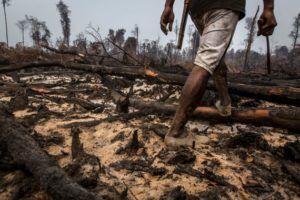

Environment
Study Estimates 100,300 Deaths From Indonesia’s Fires In 2015
Harvard and Columbia university have issued a groundbreaking study estimating that 100,300 premature deaths resulted from the destructive Indonesian forest fire crisis that occurred lat year.
The peer-reviewed study published today used air pollution readings and satellite data to calculate forest fire smoke exposure, estimating that 2,200 premature deaths occurred in Singapore, 6,500 in Malaysia and 91,600 in Indonesia. [1] The estimate is vastly greater than the Indonesian government’s official statement last year that just 19 people died from the haze.
Greenpeace Indonesia forest campaigner Yuyun Indradi said:
“More than a hundred thousand are estimated to have died prematurely last year. Now fires are back again. If nothing changes, this killer haze will carry on taking a terrible toll, year after year. Industry and government must take real action to stop forest clearing and peatland drainage for plantations.
“As last year’s fires raged, the Indonesian government said that 43 million people were exposed to smoke across the country, and half a million suffered from smoke-related respiratory illness. Now that we know the scale of the death toll, failure to act immediately to stem the loss of life would be a crime.”
In addition to the 2015 fires, the independent team of twelve public health and atmospheric modelling scientists also examined 2006, another bad haze year. For the July-October 2006 fire season they found an estimated 37,600 premature deaths: 34,600 in Indonesia, 2,300 in Malaysia and 700 in Singapore. The researchers note that during the 2006 fires crisis, burning in industrial oil palm and pulpwood plantations accounted for around 40% of total fire emissions in Sumatra and around 25% in Kalimantan.
Dr Nursyam Ibrahim, Deputy of the West Kalimantan chapter of the Indonesian Medical Association said:
The greatest impact from breathing particles from peat fire smoke falls on vulnerable groups such as the elderly, pregnant women, babies and children.
“The Indonesian Medical Association in West Kalimantan calls on all parties to work together to prevent fires, especially in peatlands. What is at stake is a decline in the quality of Indonesia’s future human resources. We are the doctors who care for the vulnerable groups exposed to toxic smoke in every medical centre, and we know how awful it is to see the disease symptoms experienced by babies and children in our care.”
Fires in peatlands drained for plantations are a major contributor to the deadly haze that afflicts the region, smouldering for days or weeks underground in conditions which release three to six times more smoke particulates than fires elsewhere. [2] The new report found that fires in peat accounted for 72% of the energy released by fires in Sumatra and 43% of that in Kalimantan, as recorded by satellite in 2015. Greenpeace and other NGOs have been pushing for full forest and peatland protection to prevent fires.
The cost to human health calculated in the new report is a conservative estimate, because the study did not include the impacts of the cocktail of other toxins which formed part of the haze, such as carbon monoxide, formaldehyde, hydrogen cyanide, arsenic and a host of others. It considered only premature adult deaths brought on by breathing high levels of smoke particles known as PM2.5. Measuring 2.5 micrometres or less, they are small enough to be inhaled and some are small enough to be absorbed into the bloodstream. They are known to cause deaths due to lung, heart and circulatory diseases including asthma, heart attack and stroke. [3] Harm to children and pregnancies was not included, although the report notes that “impacts on children are likely significant.”


 Environment12 months ago
Environment12 months agoAre Polymer Banknotes: an Eco-Friendly Trend or a Groundswell?

 Features11 months ago
Features11 months agoEco-Friendly Cryptocurrencies: Sustainable Investment Choices

 Features12 months ago
Features12 months agoEco-Friendly Crypto Traders Must Find the Right Exchange

 Energy11 months ago
Energy11 months agoThe Growing Role of Solar Panels in Ireland’s Energy Future





























